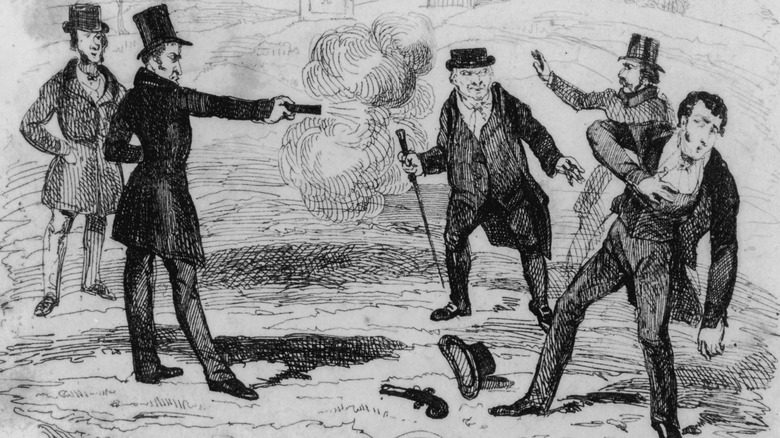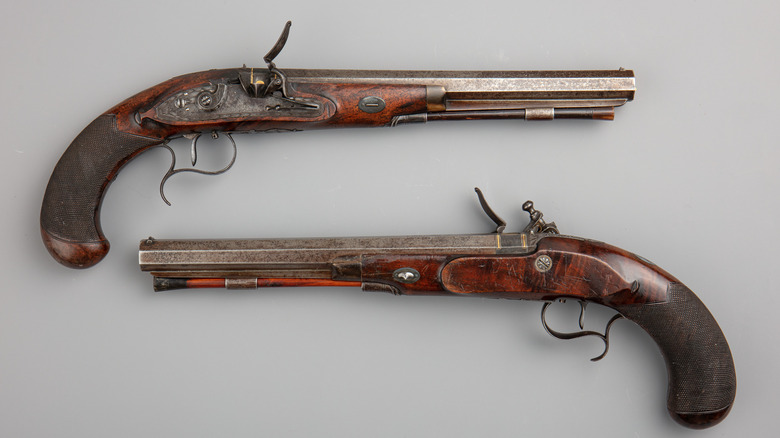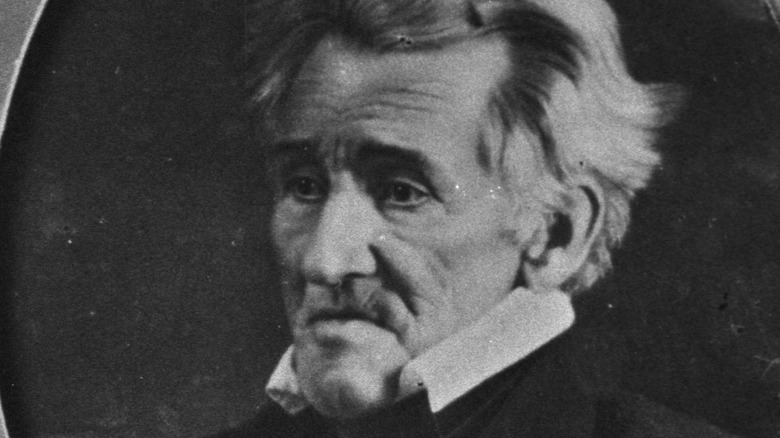The Odd Way Duels Are Part Of Becoming An Elected Official In Kentucky
When somebody's personal honor is impugned, it tends to elicit a reaction. Some of us are verbose and quick-witted enough to deliver a scathing put-down at a moment's notice and consider justice served from there. Throughout history, though, duels have been the deadlier reaction to such slights.
There have been high-profile duelists and high-profile deaths as a result of them. As The Vintage News reports, President Andrew Jackson was quite the duelist, reportedly having approximately 100 such bouts during his lifetime. Duels were rarely fatal, but Jackson killed one high-profile rival named Charles Dickinson in 1806 (via History Collection). Tensions between the two rose after Dickinson reportedly labeled Jackson a "worthless scoundrel" and "coward" in a newspaper article. Jackson's opponent was an excellent shot, who struck and badly wounded him, but the future president's retaliatory shot was immediately fatal.
The Vintage News goes on to state that this particular duel took place just inside the Kentucky border, duels having been outlawed in Tennessee. This was reportedly a very controversial affair for Jackson, and Kentucky continues to take a very dim view of duelists in its elected officials.
Kentucky's Oath Of Office Requires A Very Specific Promise
As Intelligencer reports, there hasn't been a documented duel in Kentucky since the 1860s. Nevertheless, the Bluegrass State continues to go to great lengths to weed out duelists. In December 2019, when taking up the post of Kentucky governor, Andy Beshear recited a particularly interesting part of the state's oath of office to this effect.
As seen in a clip via Twitter's Adam K. Raymond, Beshear recites the pledge, "I do further solemnly swear ... that I have not fought a duel with deadly weapons, within this state nor out of it. Nor have I sent or accepted a challenge to fight a duel with deadly weapons. Nor have I aided or assisted any person thus offending."
Intelligencer adds that Beshear acknowledged this curious section of the oath after the fact, stating that he was filled with " a sense of gratefulness, humility, excitement," regardless of the fact that "Kentucky's oath of office may sound a little outdated to some."
A painful past
This particular section of the pledge has been included since the beginning of the 19th century, and it's certainly widespread in (and, indeed, exclusive to) Kentucky, as NPR notes. Not only do governors such as Beshear have to confirm their duel-less pasts, but every judge and official operating in a state-wide capacity must do so too.
This section was reportedly put in place because duels were so common in Kentucky, but the words remain controversial today. According to NPR, Darryl Owens, state Rep. of Louisville, argued that this part of the oath "perpetuates that image of Kentucky as being backward," and that it has no place today in a solemn and formal pledge such as the one being made.
Perhaps, though, it's a matter of personal honor, of acknowledging and accepting the past, and of working to build something brighter and more positive. History Collection adds that Charles Dickinson's bullet could never be removed from Jackson's body following their May 1806 duel, and this could be seen to be very symbolic, in a macabre way.


